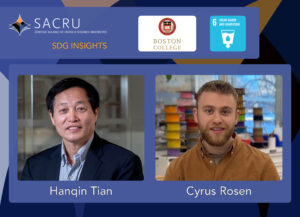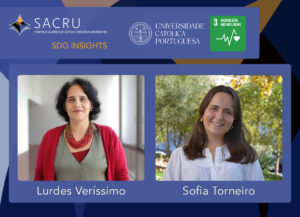Embracing vulnerability to eliminate stigma:
the message of SACRU to healthcare institutions

An international roundtable among young researchers to redefine the role of care.On April 7, in Rome, the event promoted by SACRU invited institutions to recognize vulnerability as an essential part of the human experience and integral development
Vulnerability is not an exception, but a fundamental dimension of the human experience. It does not represent a limitation, but rather a strength that unites people and calls for responsibility. Trust is rooted precisely in vulnerability: to ask for care is to seek relationships capable of embracing fragility. From this awareness, the research seminar organized by SACRU, the global network of Catholic universities, issued a call to institutions: creating spaces where people can be vulnerable in safety, within an atmosphere of trust, is essential to promoting authentic human development.
The event, held on Monday, April 7, in conjunction with the Jubilee for the Sick and the Healthcare World, took place at the Rome campus of Australian Catholic University in the presence of the designated Australian Ambassador to the Holy See, Hon. Keith Pitt. Doctoral students from seven universities within the SACRU network took part in the seminar, presenting their research on the concept of vulnerability and care, and exploring the meaning and implications of this vital connection.
The initiative marked the culmination of a journey launched in 2024, during which the doctoral students selected by SACRU Working Group on Vulnerability had the opportunity to engage with one another on their respective research projects. These explore a wide range of topics: from vaccine trials in developing countries to physician-assisted suicide, from prenatal genetic testing to interreligious dialogue on healthcare in conflict zones, from the boundaries of environmental ethics to the history of monastic medicine, from Aristotelian and Thomistic conceptions of virtue to social and ecological justice in residential care facilities for the elderly. This genuinely multidisciplinary approach perfectly reflects SACRU mission: placing higher education at the service of the Common Good by shaping new generations with a strong ethical foundation and by promoting research that generates meaningful impact on society.
The session opened with remarks from David Kirchhoffer, Director of the Queensland Bioethics Centre at the Australian Catholic University and Chair of SACRU Working Group on Vulnerability: «Since the Covid-19 pandemic and the establishment of this Working Group, we have recognized the importance of placing vulnerability at the center of our reflection, within the framework of research conducted as Catholic universities. Our goal has been to actively engage SACRU academic community, particularly young researchers. This collaboration among doctoral students is the tangible expression of this commitment and provides a valuable opportunity for the exchange of ideas and best practices between academia, healthcare professionals, and institutional representatives».
This was followed by an address from Virginia Bourke, Pro-Chancellor of the Australian Catholic University and Chair of the Board of Mercy Health Australia, who emphasized the importance of strengthening research into the ethical meaning of vulnerability for healthcare and aged care agencies. In a fragmented and rapidly evolving regulatory environment, healthcare professionals face particularly complex challenges in supporting individuals through the most delicate phases of their lives. In this regard, Bourke noted how SACRU initiative succeeded in offering a shared orientation and language, contributing to the development of a coherent ethical framework that can provide concrete added value to the healthcare sector.
The conversation reached new depth during a roundtable animated by doctoral students Lachlan Green (Australian Catholic University), Dorothy Goehring (Boston College), Gabriel Vidal (Pontificia Universidad Católica de Chile), Jefferson da Silva Bellarmino (Pontifícia Universidade Católica do Rio de Janeiro), Joana Ramos (Universidade Católica Portuguesa), Enrico Frosio (Università Cattolica del Sacro Cuore), Aitana Juan Giner (Universitat Ramon Llull), and Geetanjali Rogers (Australian Catholic University).
Simona Beretta, Full Professor of Economic Policy at Università Cattolica del Sacro Cuore and member of the Working Group on Vulnerability, contributed to the reflection: «With insights from multiple disciplines, the doctoral students shared research that interprets vulnerability not only as fragility, but as responsibility toward others. A principle of good coexistence, extending from interpersonal relationships to the organized forms of civil and political life, as exemplified by the image of the Good Samaritan who becomes vulnerable in his encounter with the wounded man, and by the encyclical Fratelli Tutti. The discussion emphasized the need to build spaces of trust, even institutional ones, where vulnerability becomes an opportunity for mutual growth and integral human development».
The session concluded with remarks by James Keenan, theologian and Vice Provost for Global Engagement at Boston College: «Vulnerability is a robust concept for healthcare ethics. Not only does it identify those who experience precarity but also those who are responsive; nurses, physicians and others are vulnerable (responsive) to those in need. But the responsive ones cannot be vulnerable to another experiencing precarity unless they allow themselves to be vulnerable to the ones they accompany. Vulnerability marks then a fundamental openness that has considerable relevance for our moment in time».
The panel also reaffirmed the value of international academic collaboration, as underlined by Pier Sandro Cocconcelli, Secretary General of SACRU and Dean of the Faculty of Agricultural, Food and Environmental Sciences at Università Cattolica del Sacro Cuore: «In a global context marked by deep inequalities and growing mistrust in science, today’s panel demonstrates how academic research can once again place human dignity at the center and make a concrete contribution to the common good. This initiative is even more meaningful in the wake of the Jubilee of the Sick and the Healthcare World. SACRU is committed to continuing to promote spaces for dialogue and collaboration, so that the next generation of scientists can face the great ethical and social challenges of our time with rigor, passion, and responsibility».
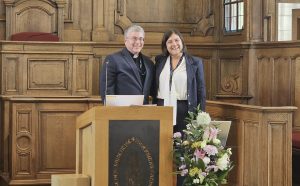

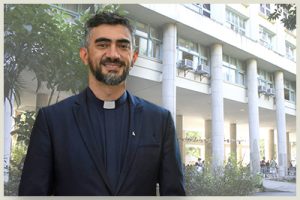
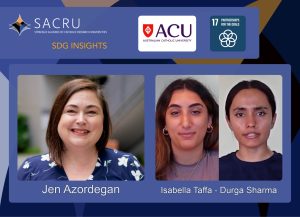 The Australian Catholic University has realized this insight through an article written by Jen Azordegan, Manager of Community-Engaged Learning, and a video by Isabella Taffa, Bachelor of Nursing student, and Durga Sharma, Bachelor of Biomedical Science student
The Australian Catholic University has realized this insight through an article written by Jen Azordegan, Manager of Community-Engaged Learning, and a video by Isabella Taffa, Bachelor of Nursing student, and Durga Sharma, Bachelor of Biomedical Science student


